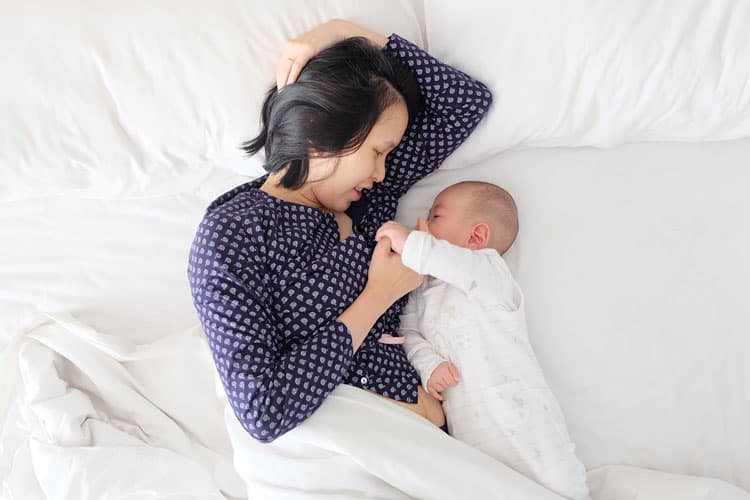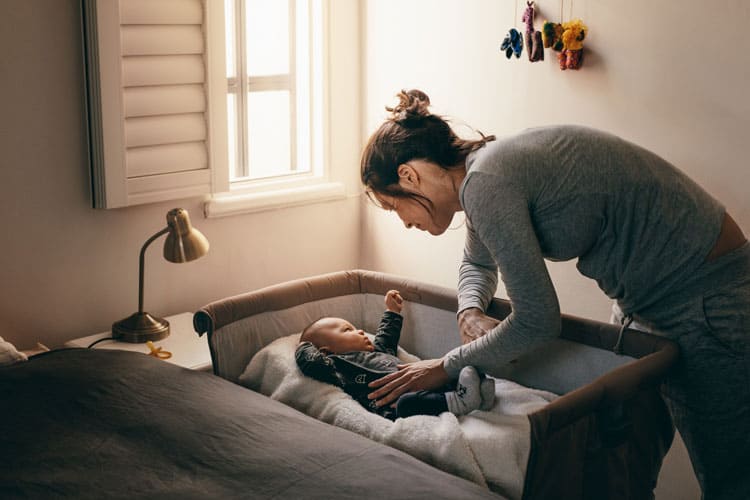Co-sleeping and bed sharing typically refers to when a baby sleeps in the same bed or in close proximity to an adult on a different sleep surface. While the topic is controversial, there are advantages (when following safe sleep guidelines) and disadvantages of co-sleeping and bed sharing. If you’re trying to decide what’s best for you and your family, we’ve broken down some of the pros and cons below.
The Pros:

It makes breastfeeding easier
Having your baby right next to you makes breastfeeding ten times easier, especially during those first few weeks when all baby wants to do is feed. Your little one will be right next to you so you’ll be able to easily and literally nurse on demand. Chances are you’ll be more comfortable breastfeeding while bed sharing rather than breastfeeding while sitting in a rocking chair or glider. Studies show that mothers who bed share are more likely to breastfeed their child longer over time than mothers who do not bed share.
You and your baby can get more sleep
Infants love being close to mom because they feel safe and comforted. When co-sleeping and bed sharing, you are right there next to them offering that needed level of love resulting in baby getting more sleep; and more sleep for baby equals more sleep for mom! When done safely and correctly, bed sharing and co-sleeping (especially when breastfeeding) give mom and baby more hours of safe infant sleep through the night.
You can respond to baby more quickly
Sometimes babies stir, cough, or make noises that might alarm you when they are only a few days or weeks old. By being right next to baby, you’re able to have a faster response time to any noises you hear. You’re also able to check baby’s breathing easily rather than wondering from another room if they are okay, which reduces overall new-baby anxiety. And trust us, even if you think you won’t, you will wonder if your baby is breathing at some point!
You get more timeless cuddles
You’ve heard it before—they don’t stay little for long! While your little one is young, cuddling and snuggling with them is precious time to bond. As long as these snuggles are done safely, especially if your baby has a low birth weight, both child and parent benefit and build an amazing connection.
It helps you be minimal
If you have a small space or want to be minimal when it comes to baby sleepers and cribs, co-sleeping and bed sharing is a good way to limit how many baby items you have. In a world of rockers, swings, pack n plays, cribs, bassinets, and more, having one less piece of baby equipment can really make a difference.
Physical touch is so important
According to an article from 2019, bed sharing with baby can actually help them develop well. Physical touch is a huge aspect of parent-to-baby bonding. This is why most doctors recommend “skin-to-skin” contact, especially right after baby is born. If breastfeeding, physical touch will help with milk flow and production and encourage your baby to nurse.
Related articles:
- 7 Sleep Tips From a Certified Sleep Consultant
- Baby Sleep Problems: Top Things That Disturb Baby’s Sleep
- Best Sleep Schedules for Infants & Toddlers
- Expert Sleep Advice for Holiday Travel
The Cons:

It can increase the risk of SIDS
The AAP (American Academy of Pediatrics) states that approximately 3500 infants die annually from SIDS (Sudden Infant Death Syndrome). A large cause of SIDS is due to accidental suffocation and strangulation in bed, so the AAP strongly recommends safe infant sleep practices. These guidelines include (but are not limited to) laying baby flat on their back on a firm surface without any loose clothing, blankets or any soft items nearby. As a new parent, being aware of safe sleep standards for baby is essential.
Less intimacy with your partner
Co-sleeping and bed sharing mean a child is always in bed with you and your partner. So let’s be honest, chances are there are going to be fewer moments for intimacy. While less intimacy may help you not get pregnant right away (if you’re trying to avoid that), reduced intimacy (or having none at all) can negatively affect you and your partner’s relationship over time.
You’ll have less time to yourself
If you’re a stay-at-home mom or have an extended maternity leave, you’re spending the majority of your time with your child. For many moms, evening time after baby has gone to bed is the only “alone” time that can be had. If co-sleeping or bed sharing, this time can be limited quite a bit, especially if your child is unable to fall asleep without you laying next to them.
Makes transitioning to a crib or room harder
When you have an infant you’re probably not thinking about sleep transition just yet, but it will come one day! The longer you choose to co-sleep or bed share, the harder it will probably be to transition your little one to their own bed or room when the time comes.
You may feel like a human pacifier
For nursing moms, breastfeeding seems to be easier when your baby is already laying near your breast but there’s a downfall…a lot of moms complain of feeling like a human pacifier. With breasts that much closer to baby, they are easily accessible and babies love to be soothed to sleep while nursing (just like if they are using a regular pacifier).
Harder to get up without disturbing baby
Of course, there will be times when you need to get out of bed to pee, eat, or simply wake up for the day. When you share a bed with your baby, getting out of bed without waking them can be a challenge. And we all can agree that the more baby sleeps, the better it is for everyone involved.
Risk of baby falling out of bed
If co-sleeping and bed sharing means that the baby is literally laying next to you in the bed (as opposed to next to the bed in an attached bedside sleeper), then there’s a high risk that your baby could fall out and seriously injure themselves. A baby lounger, such as a DockATot helps keep baby in one place but as always, you’ll want to read the manufacturer’s guide before using it for safe infant sleep.
When it comes down to it, parents should seriously weigh the pros and cons of co-sleeping and bed sharing so that they can make an informed decision that is the safest for their family. What are your thoughts on co-sleeping and bed sharing? Share with us below!

Morgan French is a wife, mom of two, writer & editor. After traveling for 3 years with her family, she now lives back in her hometown of Dayton, OH. She makes frequent stops for coffee, enjoys the outdoors, and loves board games.



Leave A Comment